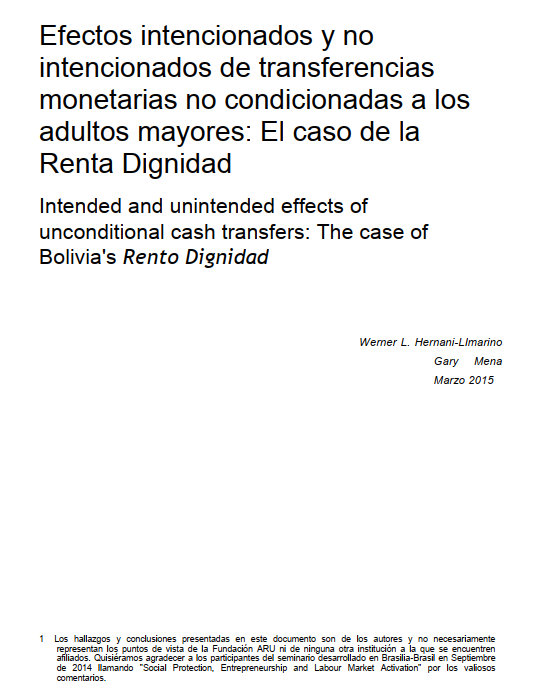Intentional and unintended effects of Unconditional Monetary Transfers to Older Adults: The Dignity Income Case
DOI:
https://doi.org/10.35319/lajed.20150375Keywords:
Impact evaluation, unconditional cash transfers, non-contributive social protection system, elderly programsAbstract
This document presents a quasi-experimental impact evaluation of Renta Dignidad, a universal non-contributory pension to old-age population in Bolivia, on intended and unintended outcomes including: household's welfare, investments and savings, and labor market outcomes of direct and indirect beneficiaries. To identify the causal effects of the program we take advantage of an exogenous policy change that reduces the eligibility criteria from 65 to 60 years in December of 2007. Our identification strategy relies on both, the simple Difference-in-Difference and the more complex Changes-in-Changes approach to calculate not only average, but also quantile treatment effects. We find that non-contributor* household transfers have complex intended and unintended effects on different individual and household outcomes for different types of individuals and households. In the case of women, we find that non-contributory pensions have, on average, increased their households' non-labor income, which has decreased their labor supply and labor earnings, which in turn has decreased households' labor income. In the case of men, the transfer has increased their households' non-labor income and increased their households' per-capita income, but they latter is not significant.
Downloads
References
J. Angrist and J.-S. Pischke, Mostly Harmlcss Econometrics: An Empiricist’s Companion. 2008.
S. Athey and G. Imbens, "Supplementary Materials for: ‘Identification and Inference in Nonlinear Difference-in-Differences Models'," 2006.
S. Athey and G. Imbens, ‘Identification and Inference in Nonlinear Difference-in-Differences Models" 2002.
S. Athey and G. Imbens, “Identification and Inference in Nonlinear Difference-in-Differences Models Econometrica, vol. 74, no. 2, pp. 431—497, 2006.
M. Bertrand, E. Duflo, and S. Mullainathan, "How Much Should We Trust Differences-in-Differences Estimates?," vol. 119, no. 1, pp. 249—273, 2004.
C. Chaisemartin, "Fuzzy Differences in Differences." 2012.
C. Chaisemartin and X. D’Haultfoeuille,"Fuzzy Changes-in-Changes" 2014.
G. Imbens and J. Wooldridge, "Difference-in-Differences Estimation," 2007.
G. Imbens and J. Wooldridge, "Recent Developments in the Econometrics of Program Evaluation." 2008.
M. Lechner, “The Estimation of Causal Effects by Difference-in-Difference Methods,” Foundahons and Trends in Econometrics, vol. 4, no. 3, pp. 163—224, 2010.
O. Ropponen, Applications of treatment effects models and semiparametric estimation. 2011.
S. Martinez, "Pensions, poverty and household investments in Bolivia." 2004.
W. Hernani-Limarino and P. Villarroel, "Effects of Renta Dignidad on labour market outcomes of the elderly." Forthcoming.
W. Hemani-Limarino and M. Claure, "Reassessing the effects of Renta Dignidad using EPAM" 2014.
M. Yanez-Pagans, "Culture and Human Capital Investments : Evidence of an Unconditional Cash Transfer Program in Bolivia," 2008.
W. Hemani-Limarino and A. Eid, "Entrepreneurship and Economic Mobility: A Case of study of Bolivia." 2012.
F. Escobar, S. Martinez, and J. Mendizabal, "El impacto de la Renta Dignidad: Política de Redistribución del Ingreso, Consumo y Reducción de la Pobreza en Hogares con Personas Adultas Mayores.” 2013.
R. Rofman and M. Oliveri, La cobertura de los sistemas previsionales en América Latina: conceptos e indicadores, vol. 7 of Serie de Documentos de Trabajo sobre Politicas Sociales. 2011.






